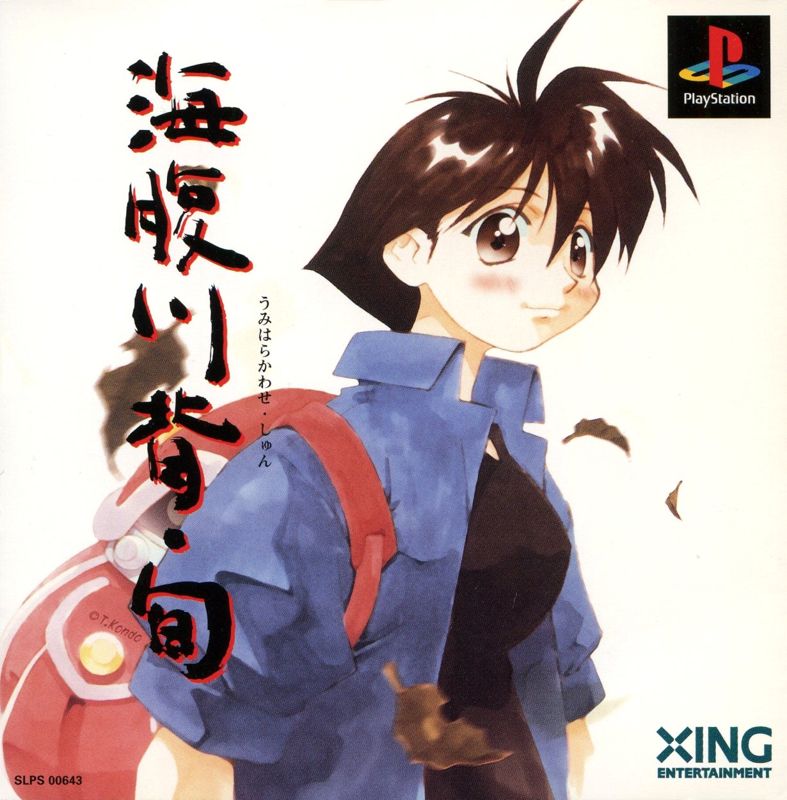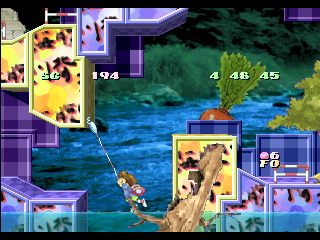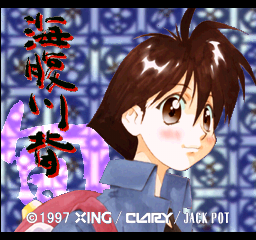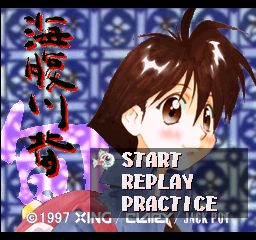Retro Replay Review
Gameplay
Umihara Kawase: Shun centers around a deceptively simple premise—a young girl armed with a fishing line that doubles as a grappling hook must traverse perilous, water-logged stages. The controls are elegantly tuned to the hook’s pendulum physics, requiring players to master momentum, angle, and timing to clear gaps or ascend to higher platforms. Each stage feels like a carefully constructed puzzle, rewarding patience and experimentation rather than brute force.
(HEY YOU!! We hope you enjoy! We try not to run ads. So basically, this is a very expensive hobby running this site. Please consider joining us for updates, forums, and more. Network w/ us to make some cash or friends while retro gaming, and you can win some free retro games for posting. Okay, carry on 👍)
Much like the classic Bionic Commando, Shun’s core mechanic is the tether between character and environment. There are no power-ups to dilute the challenge; every swing, climb, and launch relies on player skill. As you tie your line to corals, platforms, or exotic seaweed, you’ll discover multiple solutions to obstacles—sometimes a direct swing, other times a carefully executed series of small hops and pulls.
The aquatic world is rife with mutated sea creatures that serve both as hazards and dynamic elements in level design. Some enemies patrol set paths, while others react to your presence, forcing you to think two steps ahead. Direct combat is minimal; instead, the emphasis is on avoiding or cleverly displacing foes with well-aimed grappling moves. This blend of platforming and environmental puzzle-solving creates a fresh, satisfying rhythm.
Difficulty ramps up gradually, inviting newcomers to learn the hook’s quirks before testing veterans with time-limited challenges and secret areas. The satisfaction of clearing a particularly tricky section—requiring split-second timing and a clear spatial understanding—is a hallmark of the experience. Replaying stages to shave seconds off your time, or to uncover hidden exits, adds significant replay value for completionists.
Graphics
Visually, Umihara Kawase: Shun embraces a hand-drawn aesthetic reminiscent of classic Japanese platformers, with vibrant color palettes that highlight the game’s underwater setting. Coral reefs glow in pastel shades, sunken ruins loom in the distance, and shifting light rays pierce the murky depths, giving each level a memorable atmosphere.
Character sprites are expressive and fluid, with the protagonist’s movements—swings, leaps, and stumbles—animated in crisp detail. Enemy designs range from adorable mutated fish to menacing crustaceans, striking a balance between charm and danger. The subtle splash and bubble effects whenever the line is cast or enemies are struck add a tactile feel to the world.
Backgrounds are richly layered, featuring drifting schools of fish, swaying seaweed, and distant silhouettes of giant marine creatures. Parallax scrolling enhances depth as you swing across the screen, making each traversal feel more immersive. Despite its 2D nature, the game’s visual direction convincingly conveys a three-dimensional underwater expanse.
Overall, the graphical presentation serves the gameplay impeccably. Clarity is never sacrificed for style; hitboxes are easy to read against the backdrop, and visual cues guide players toward interactive elements. Whether you’re a fan of retro-inspired art or simply appreciate cohesive design, Shun’s visuals stand out as one of its strongest assets.
Story
While Umihara Kawase: Shun doesn’t lean heavily on narrative cutscenes or dialogue, it weaves its tale through environmental storytelling. You play as Kawase, a determined young explorer who ventures into an otherworldly sea to uncover the origins of a mysterious hook you’ve discovered. The sense of solitude and wonder pervades every stage, painting a picture of an untamed aquatic realm waiting to be decoded.
Each area hints at a deeper history: collapsed structures suggest an ancient civilization, and strange murals imply a long-forgotten connection between humanity and the sea. As you progress, logbooks and cryptic symbols offer subtle clues about the world’s past. The minimalist approach to story encourages players to piece together the lore themselves, fostering a personal investment in Kawase’s journey.
Mutated sea creatures are not just gameplay obstacles; they serve as narrative devices, showing how the environment has been altered by unknown forces. Their increasing aggressiveness mirrors the tension in Kawase’s quest, subtly raising the stakes as you venture further into uncharted territories. This narrative interplay between level design and creature behavior keeps the storyline intriguing without heavy exposition.
By the time you reach the final levels, the cumulative sense of discovery and the unanswered questions about the hook’s origin create a lasting impression. Even though some players may wish for more explicit storytelling, the game’s pared-down narrative fits perfectly with its puzzle-oriented design, leaving room for imagination and post-game discussion.
Overall Experience
Umihara Kawase: Shun delivers a distinctive blend of platforming and environmental puzzles that few games have matched. Its hook-based traversal system is simultaneously intuitive and deep, offering new layers of mastery long after the opening levels. The absence of cheap power-ups ensures that every triumph feels earned, appealing to players who crave skill-driven challenges.
The game’s pacing strikes a fine balance between gentle introduction and escalating difficulty, making it accessible without sacrificing depth. Few titles manage to blend an elegant control scheme with compelling level design so seamlessly. Whether you’re experimenting with crazy rope swings or meticulously fine-tuning your route through a gauntlet of enemies, Shun rewards creativity and precision in equal measure.
From an aesthetic standpoint, the vibrant, hand-drawn world and fluid animations foster an enchanting atmosphere that pulls you deeper into the story. Sound design—subtle water effects, ambient music, and bite-sized sound cues upon successful grapples—complements the visuals, creating a cohesive sensory experience.
For potential buyers seeking an unconventional platformer with high replay value, Umihara Kawase: Shun is a standout choice. Its unique hook mechanic sets it apart from more traditional offerings, and its thoughtful level layouts encourage both casual exploration and hardcore speedrunning. If you value innovation, challenge, and charm in your gaming experiences, Shun is well worth your time.
 Retro Replay Retro Replay gaming reviews, news, emulation, geek stuff and more!
Retro Replay Retro Replay gaming reviews, news, emulation, geek stuff and more!







Reviews
There are no reviews yet.